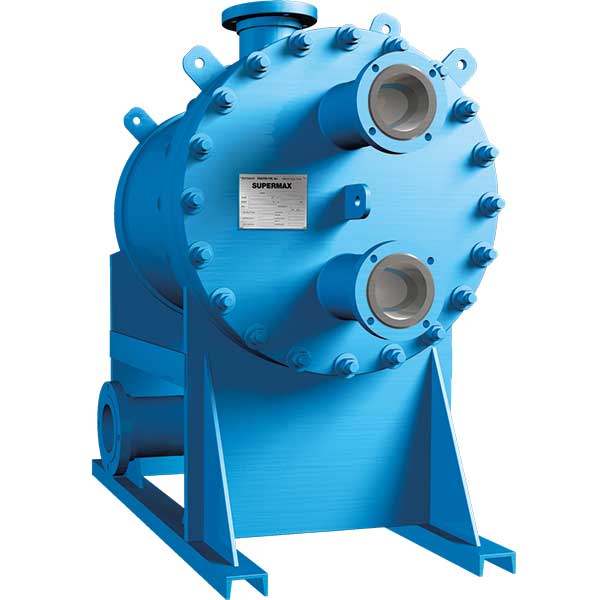SUPERMAX® Shell And Plate Heat Exchanger
The SUPERMAX® Shell And Plate Heat Exchanger is designed as a performance upgrade over shell and tube, block-type welded and brazed aluminum heat exchangers. The unit can overcome footprint constraints, extreme pressures/temperatures, fouling/scaling conditions and corrosive attack with liquids, gases, steam and two-phase mixtures.
REDUCED FOOTPRINT
Compact size and low installed weight, especially when filled
WIDE TEMPERATURE/PRESSURE RATINGS
Good performance with natural refrigerants such as ammonia and carbon dioxide
EXCELLENT THERMAL PERFORMANCE
Close temperature approach of 1ºC (2°F) –similar to that of gasketed plate heat exchangers

OUTSTANDING UPTIME
Highly turbulent flow produces high heat transfer efficiency and limits fouling, or freezing in refrigeration/cryogenic service
SMALL HOLD-UP VOLUME
Fast start-ups and close following of process changes; low refrigerant charges for refrigeration and cryogenic service
TWO-PHASE FLUID FLEXIBILITY
Extended-thermal-length oblong plates expand capabilities to wide-ranging evaporation and condensing applications
RELATED SHELL AND PLATE APPLICATIONS
- Particulate-laden flows: Turbulent flow, even at low velocities, enables stable capacity regulation and minimizes fouling
- Refrigeration and cryogenic service: the exchangers require a low refrigerant charge; are also resistant to freezing because of high fluid turbulence
- Internal phase changes: on either the plate or shell side
- Large flow imbalance: Allow higher flow rates on the shell side
- Installation factors: Can be installed horizontally or vertically
RELATED SHELL AND PLATE SERVICES
- Standard and deep-draw plates enable accommodation of flow rate and pressure drop constraints. Oblong plates enable configuration to attain necessary thermal length
- Removable Core exchanger provides full accessibility to the thermal element for inspection and/or mechanical cleaning of the shell side channel by removing the plate pack bundle
- The Multi-Duty exchanger has two separate plate packs that share one shell, handling different or identical fluids
- Multi-Pass configurations for gas or vapor cooling without condensing
- Co-current or counter-current plate groupings
HOW THE SUPERMAX SHELL AND PLATE HEAT EXCHANGER WORKS
- The shell and plate welded heat exchanger has a heat transfer element composed of round or oblong chevron-type plates welded into a cassette by a porthole perimeter weld
- Cassettes are placed together and welded to each other using a perimeter weld
- The thermal element subassembly then has metal shell-side flow diverters, nozzles and an end plate welded to it
- An exclusive cage structure, welded only to the end cover, surrounds and supports the plate core pack assembly
- The finished exchanger is a pressure vessel of high integrity, with an accordion-like core that is highly tolerant of thermal expansion
WANT TO LEARN MORE ABOUT HOW GOOD ENGINEERING CAN HELP YOU?
Submit your email address and we will send you our guide where we take a look at good engineering practices for all Shell and Plate Heat Exchangers.
In the guide, we aim to give you insights on how to improve and the importance of the reliability, availability, and maintainability process.
SHELL AND PLATE VS. SHELL AND TUBE IN EQUIVALENT DUTIES
| Model | Required Surface Area, m2 (ft2) | Footprint Area, m2 (ft2) | Dry Weight, kg (lb) |
|---|---|---|---|
| TEMA Shell And Tube | 203 (2,187) | 9 (100) | 6,350 (14,000) |
| SUPERMAX Shell And Plate (SPW-55) | 56 (600)* | 0.7 (8) | 726 (1,600) |
